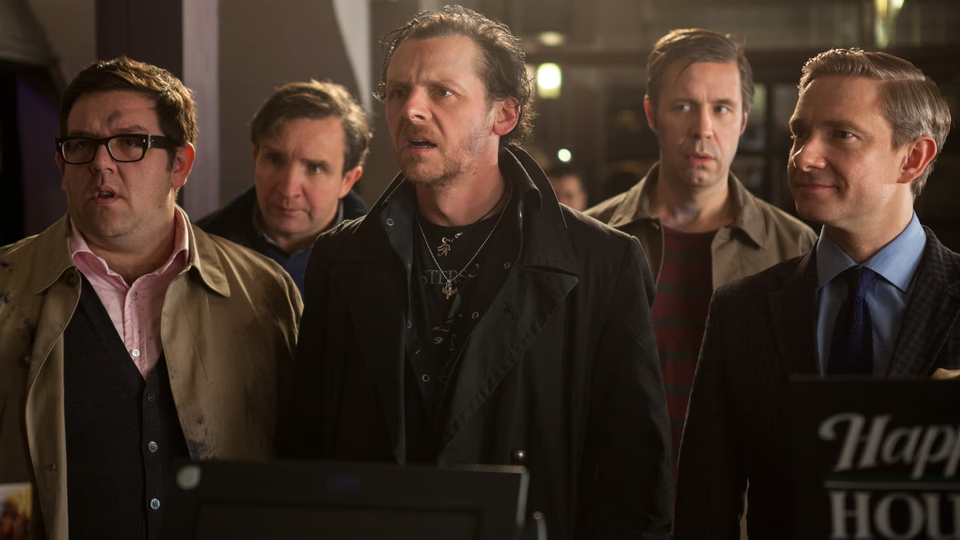The World's End

Time is a funny thing. When I revisited director Edgar Wright’s Shaun of the Dead after twenty years, I found it wasn’t as good as I remembered. Yet rewatching The World’s End, the closing chapter of Wright’s “Cornetto Trilogy,” after twelve years had the opposite effect. What I once dismissed as the trilogy’s weakest entry revealed itself as a surprisingly mature meditation on aging, friendship, and the perils of nostalgia wrapped in an engaging sci-fi horror comedy.
The film follows Gary King, played by Simon Pegg, a forty-something man-child desperate to recreate his life’s crowning achievement: a legendary pub crawl through twelve bars in his hometown of Newton Haven, culminating at the titular World’s End. Gary corrals his old schoolmates—all now successful professionals with families and responsibilities—into one last attempt at the “Golden Mile.” But their homecoming takes an unexpected turn when they discover their hometown harbors a sinister secret, transforming what begins as a meditation on arrested development into a paranoid sci-fi thriller reminiscent of Invasion of the Body Snatchers.
Pegg shines as Gary, walking a delicate tightrope between charm and irritation. His charismatic ne’er-do-well could easily become grating, but the script wisely positions every other character as a voice of reason, contextualizing Gary’s behavior as the tragedy it is. Nick Frost provides the perfect counterpoint as Gary’s former best mate, now a teetotaling family man—a clever inversion of his Shaun of the Dead character.
Wright’s direction crackles with his signature energy, while his careful attention to detail rewards repeated viewing. The film’s soundtrack, drawn largely from Gary’s ancient mix tapes, perfectly captures both the allure and limitations of nostalgia. In a particularly inspired touch, despite Gary’s Sisters of Mercy t-shirt and tattoo, we don’t hear the band’s music until the third act, when “This Corrosion” arrives at the perfect dramatic moment.
Script-wise, Wright and co-writer Pegg explore the same themes of maturation and transitioning to adulthood present in Shaun of the Dead, but from a different perspective. Where Shaun of the Dead celebrated its protagonists’ immaturity by positioning them as audience surrogates, The World’s End takes a more nuanced approach. Here, we identify with Gary’s friends—the adults in the room—who view his antics with a mixture of pity and frustration. This shift in perspective makes the film particularly resonant for middle-aged viewers like myself.
The film’s only significant misstep comes in its final act. Rather than follow through on its themes of necessary maturation, the script introduces some contrived plot mechanics that allow Gary to remain in a state of perpetual adolescence, leading a tribe of robotic “lost boys.” While this ending maintains the film’s comedic tone, it feels like a thematic cop-out, avoiding the harder truths about growing up that the rest of the film so fearlessly explores.
Despite this stumble, The World’s End has aged remarkably well, perhaps because its core themes—the tension between nostalgia and growth, the challenge of maintaining friendships as we age, the ways our hometowns both change and stay the same—only become more relevant with time. Younger viewers may still find Shaun of the Dead more immediately appealing, but that’s fine. The World’s End will be waiting for them.